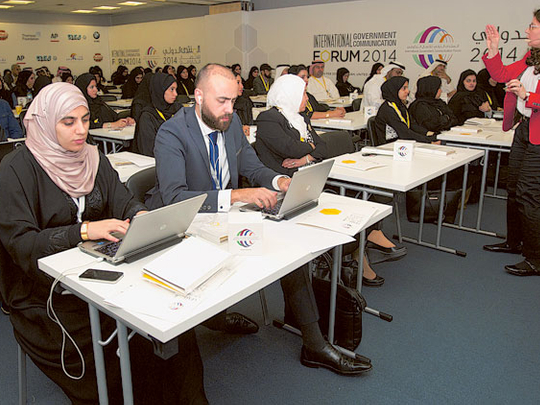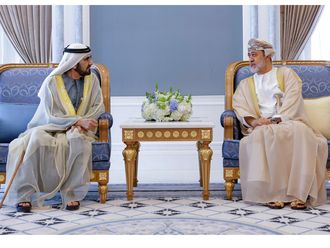
Sharjah: The best government communication practices to manage day-to-day operations were discussed during a workshop held as part of the International Government Communication Forum 2014 (IGCF 2014) in Sharjah yesterday.
The workshop, which was titled ‘Predicting and Managing Crisis Effectively’, was attended by decision-makers, senior government executives and media professionals.
The sessions aimed at helping executives and decision-makers deal with emerging issues that threatened prearranged agendas through the use of a stakeholder-centric approach to managing a crisis.
The executive workshop was led by Jennifer Millerwise Dyck, senior director at APCO Worldwide, Washington, and co-leader of APCO’s crisis management and litigation communications practice.
“Today, stakeholders are not only interested in an organisation’s major decisions, but have the capacity to drive outcomes by directly communicating with and influencing one another in real-time situations,” Dyck said.
In addition to the executive workshop, two parallel training workshops were conducted for professionals in the media and government communications industry.
The first workshop, titled ‘Social Media in a Changing World’, offered insights into the changing role of social media during emergencies and its impact on citizen behaviour.
It was conducted by Donald Steel, a specialist in reputation and crisis management who is currently the Associate Director of Crisis Communications at Kenyon International Emergency Services, a leading full-service disaster management company.
“Through this workshop, we explored how social media is changing the speed at which we should communicate in a crisis, this is extraordinarily challenging. It is very clear that our reputation relies on our pro-activeness in addressing this issue,” Steel said.
Steel pointed out that educating the public on what is appropriate to be communicated and how best to react to such communication would go a long way in effectively handling crisis communications, and ensuring that people feel included in the government’s crisis management agenda.
Dr Zahera Harb, senior lecturer in International Journalism at the Journalism Department, City University London, conducted a second workshop on ‘The Changing Role of Government Communications’. The session highlighted the digital revolution’s impact on governments’ dissemination of information to the public, and the change in theories that defined the relationship between the message, the messenger and the receiver.
“Proper government communication is an essential that has to be implemented through proper planning and needs to be updated frequently through a three-step process which involves initiating the launch, planning, and evaluating in that order,” she added.
This year the forum, which has been organised by the Sharjah Media Centre, is themed ‘Different Roles... Mutual Interest’ and will take place at the Expo Centre Sharjah today. The three-day forum will run until February 24.
The forum will discuss the positive impact of government communication on the relationship between governments and their audiences.
IGCF 2014 will also explore the role that government communications could play in improving a country’s image and influencing its economic, social, and political future.












